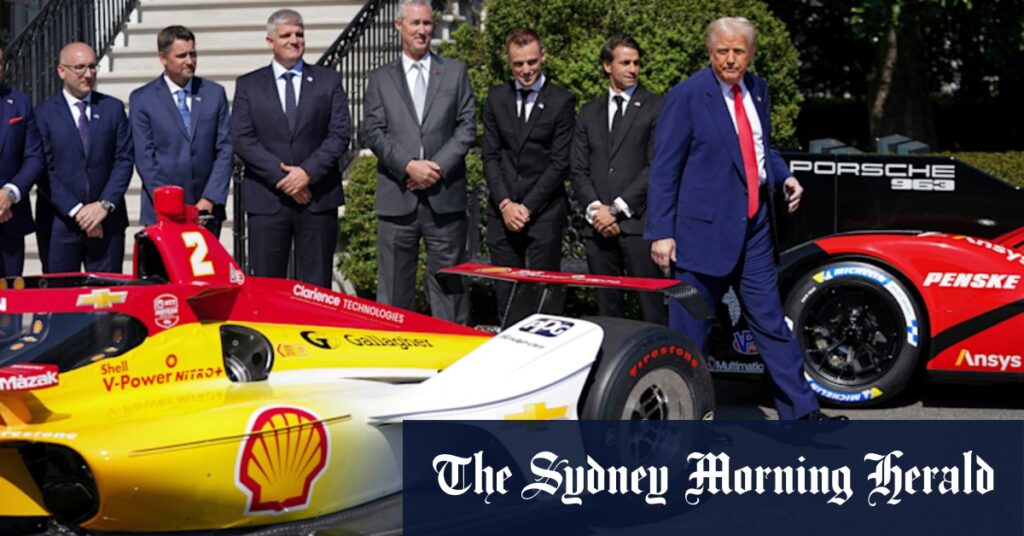Trump’s decision to pause the tariffs and send sharemarkets soaring came just hours after he told nearly 10 million followers on Truth Social: “THIS IS A GREAT TIME TO BUY!!! DJT.”
Loading
Countries most impacted by the backdown include Japan and South Korea, which had been given tariffs of 24 and 25 per cent respectively, India (26 per cent), Vietnam (46 per cent) and the European Union (20 per cent). Tariffs on Mexico and Canada – which were excluded from the “reciprocal” tariff program – were unaffected.
US sharemarkets, which had lost trillions in value since Trump unveiled the larger-than-expected tariffs last Thursday, skyrocketed within moments of the backflip. The Nasdaq, Dow Jones and S&P500 all rallied more than 6 per cent, with the Nasdaq climbing as much as 10 per cent in early afternoon trade.
Asked about the administration’s dramatic policy reversal, Bessent said Trump had “created maximum negotiating leverage for himself”.
“It took great courage for him to stay the course until this moment,” he said. “As I told everyone a week ago … do not retaliate and you will be rewarded.”
Loading
Bessent said the administration had been overwhelmed by the response from US allies. But the only certainty he could give them was the US would now negotiate in good faith.
“We will see what China does,” he said. “What I’m certain of is that what China is doing will affect their economy much more than it will ours because they have an export-driven, flood-the-world-with-cheap-exports model.”
White House press secretary Karoline Leavitt said more than 75 countries had contacted the administration to negotiate trade deals and attacked reporters for what she cast as their insufficient faith in Trump’s strategy.
“Many of you in the media clearly missed the art of the deal. You clearly failed to see what president Trump is doing here,” she said.
“You tried to say the rest of the world would be moved closer to China when in fact we’ve seen the opposite effect. The entire world is calling the United States of America, not China.”
The previous night, at a black tie Republican Party function in Washington, Trump boasted world leaders were ringing up and “kissing my ass” to strike a deal on the tariffs.
In his Truth Social post announcing the reversal, Trump said China had shown a lack of respect to world markets and would therefore be hit by a 125 per cent tariff, effective immediately.
“At some point, hopefully in the near future, China will realise that the days of ripping off the USA, and other countries, is no longer sustainable or acceptable,” he wrote.
Canadian Prime Minister Mark Carney welcomed Trump’s 90-day pause on some tariffs charged on trading partners, while flagging a “fundamental restructuring” of international trade.
“The pause on reciprocal tariffs announced by President Trump is a welcome reprieve for the global economy,” Carney said in a post on X.
“As part of today’s announcement, the [US] President has signalled that the U.S. will engage in bilateral negotiations with a number of other countries.
“This will likely result in a fundamental restructuring of the global trading system.”
Loading
Carney said the US and Canada would commence negotiations on a new economic and security relationship immediately after the April 28 election in Canada.
Before Trump’s tariff turnaround, European Union member states voted to approve the retaliatory tariffs on $US23 billion ($37 billion) in goods in response to Trump’s earlier 25 per cent tariffs on imported steel and aluminum.
Those tariffs would go into effect in stages, with some on April 15 and others on May 15 and December 1. But members of the 27-country bloc repeated their preference for a negotiated deal to settle trade issues.
“The EU considers US tariffs unjustified and damaging, causing economic harm to both sides, as well as the global economy. The EU has stated its clear preference to find negotiated outcomes with the US, which would be balanced and mutually beneficial.”
European Commission President Ursula Von der Leyen, who heads the EU’s executive arm, said the bloc remained committed to constructive negotiations with the US, with the goal of achieving “frictionless and mutually beneficial trade.”
“Clear, predictable conditions are essential for trade and supply chains to function,” she said in a statement on X.
With AP, Reuters
Get a note directly from our foreign correspondents on what’s making headlines around the world. Sign up for our weekly What in the World newsletter.


